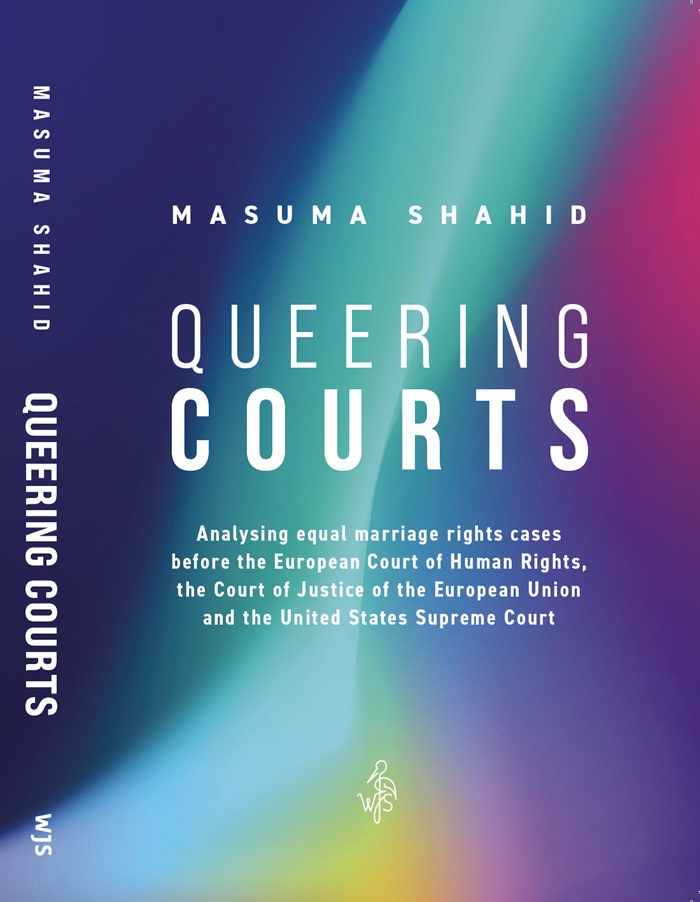
Same-sex couples all around the world have increasingly sought (equal marriage) rights to be able to equally enjoy all of the benefits linked to the institution of marriage and the legal recognition of relationships that different-sex couples enjoy automatically. It is in this regard that cases were brought before courts such as the European Court of Human Rights (ECtHR), the Court of Justice of the European Union (CJEU) and the United States Supreme Court (US Supreme Court) for judicial relief. The research in this dissertation of Masuma Shahid critically reflects on how these specific courts interpret and ‘construct’ the notions of ‘sex,’ ‘gender,’ ‘sexuality’ and ‘sexual orientation’ as regards equal marriage rights for same-sex couples.
Besides analysing cases through traditional doctrinal legal research methods, this study employs queer legal theory and the technique of ‘deconstruction’ to expose any underpinnings, assumptions and/or beliefs that underlie the interpretations and what consequences this might have for sexual minorities. By queering the courts’ equal marriage rights case law, the research in this dissertation reveals that certain ‘consensus’ or ‘originalism’-based interpretations are favoured predominantly towards ‘heteronormativity’ and ‘cisgenderedness.’
Furthermore, the research establishes that there are various factors that influence the interpretations of the courts, these being the state of science and knowledge on sexuality and relationships, history, culture and social structures, religion, morality and ethics, politics and the resources available for interpretation. Although the preference for cisgenderedness appears to have been let go due to a change in some of these factors (i.e. scientific knowledge, the availability of more resources for interpretation etc.), the privileging of heteronormativity nevertheless largely remains. Even the ground-breaking cases are significantly limited in scope and do not provide same-sex couples full entitlement to rights. This raises the question as to why this is the case. Research reveals that courts interpret the way they do because of underlying issues of credibility, legitimacy and authority vis-à-vis the states. Equal marriage rights raise sensitive moral, ethical, political and/or religious issues; therefore, courts sometimes exercise self-restraint due to fears that their decisions will be met with resistance. Not wanting to lose credibility and authority, it is easier to defer authority to states to decide on the matter. This results in an ‘othering’ of same-sex couples falling outside of the narrowly determined perimeters of the interpretations and missing out on full equal marriage rights. Such interpretations uphold and actively contribute to the (institutionalised) discrimination and marginalisation of same-sex couples. The research proposes four queer approaches that courts could alternatively apply to provide much-needed ‘queer solace’ to applicants. The first is to consider the notions of sex, gender, sexuality and sexual orientation not as fixed binary constructs, yet more as fluid or spectra containing a multitude of variations therein. The second would be a stronger focus on ‘dignity,’ an already deeply rooted principle in many international human rights conventions and a concept separate from someone’s sex, gender, sexuality or sexual orientation. It is furthermore closely related to the notion of universality of human rights. A third approach would be to provide an ‘equal level playing field’ by focusing less on heteronormative tools and methods as regards sexual minorities (such as the inconsistent and incoherent use of ‘consensus’). A more practical application of the relevant fundamental human rights and the principle of proportionality (in balancing the interests of states vis-à-vis the same-sex couples) would suit better. A last approach would be to place more emphasis on the application of the Yogyakarta Principles.
Advantages of a queering by courts is the counteracting of the ‘othering’ of sexual minorities through institutionalised heteronormativity and cisgenderedness. In addition, having queer (legal) theory in the courts’ toolbox could also lead to a more universal and inclusive interpretation of the fundamental human rights involved and thus also of the concepts codified therein. In times in which the protection and promotion of LGBTQ+ rights is backsliding in most parts of the world, courts can strengthen their position as human rights courts by protecting sexual minorities and being LGBTQ+ ‘allies.’
Shahid defended her thesis on May 23rd 2025 at the Erasmus Universiteit Rotterdam. Promoters were Prof. dr. Ellen Hey and Prof. mr. dr. drs. Jeroen Temperman.
Masuma Shahid
Queering Courts. Analysing equal marriage rights cases before the European Court of Human Rights, the Court of Justice of the European Union and the United States Supreme Court
Commercial edition is expected by the end of the year by WJS Uitgevers.

